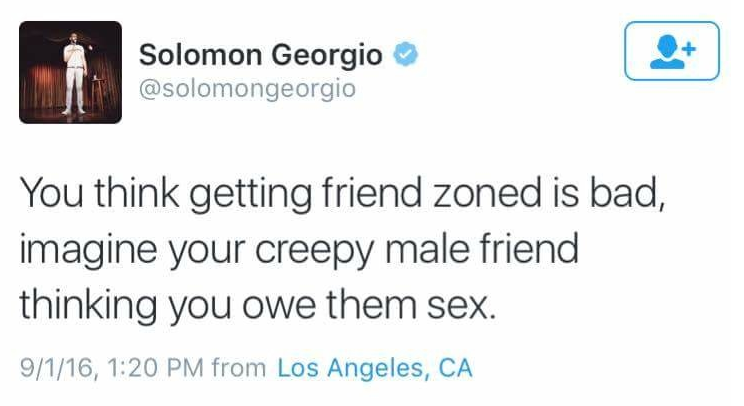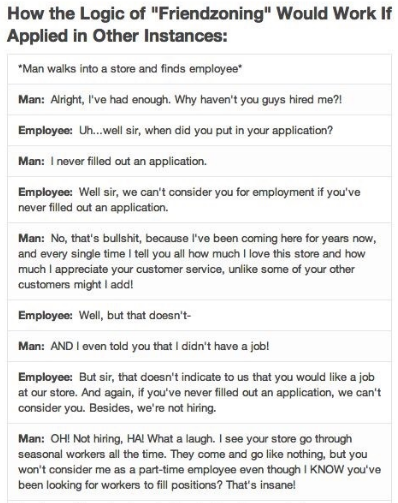The sinister logic behind 'Nice Guy Syndrome', explained by psychologists
Although if you genuinely are nice, there are ways out of the friend-zone

Your support helps us to tell the story
From reproductive rights to climate change to Big Tech, The Independent is on the ground when the story is developing. Whether it's investigating the financials of Elon Musk's pro-Trump PAC or producing our latest documentary, 'The A Word', which shines a light on the American women fighting for reproductive rights, we know how important it is to parse out the facts from the messaging.
At such a critical moment in US history, we need reporters on the ground. Your donation allows us to keep sending journalists to speak to both sides of the story.
The Independent is trusted by Americans across the entire political spectrum. And unlike many other quality news outlets, we choose not to lock Americans out of our reporting and analysis with paywalls. We believe quality journalism should be available to everyone, paid for by those who can afford it.
Your support makes all the difference.Men who complain that they are unlucky in love despite their 'nice guy' persona may have a sinister agenda.
The so-called 'Nice Guy', the often physically unattractive man who overcompensates with clingy and over-the-top behaviour to women, is relentlessly mocked online.
Dr Robert Glover, who's studied the issue, says these men are often trying to form "covert contracts" with the target of their affections.
Psychologist Dr Jesse Marczyk told The Independent: “The men who tend to get stuck in the friend-zone might not be attractive enough on their own (physically, socially, or otherwise), and so try to compensate for their shortcomings by investing in women more than their peers. In other words, they might use kindness to try and make up for what they lack elsewhere.”
The idea is that if you meet someone's needs without them having to ask, they should meet yours. Ergo if a man is nice to a woman, she should repay him by becoming his girlfriend, because that’s obviously how these things work.
Dr Glover said: "Others typically do not realise these contracts exist and are often surprised when the Nice Guy lashes out at their failure to keep their end of the deal."

Examples of Nice Guy behaviour include:
- Performing kind gestures with the sole motive of seducing a woman
- Insisting the reason they were rejected is “women like bad boys”
- Believing showing basic human decency and manners makes them especially “nice”
- Complaining about the difference between what women claim to want in a man and the men they actually go for.
And when things don't go their way, they often complain that they've been "friend-zoned" despite the target of their affections never being interested in the first place.
On the Reddit forum dedicated to the subject, the ulterior motives of Nice Guys are highlighted using social media posts and screengrabs:

Of course, there are also plenty of genuinely nice guys (and girls) who don’t have a sinister side to their kindness and find themselves in the dreaded friend-zone.
According to Professor Adam Grant, although being nice may not get you what you want in the short-term, it could pay off after all because people will want your help further down the line.
Whilst it may be that the object of your affections is only interested in friendship, Dr Marczyk believes that if you find yourself feeling resentful about being in the 'friend-zone', you need to change yourself to increase your chances of getting out.
First, make yourself more attractive to the person you like: “Go to the gym, groom yourself more, get a good job, increase your social status; generally do more of the things that person finds attractive. When you bring more to the table yourself, your options improve,” he explains.
If changing your lifestyle is too much time and energy, there’s another option, according to Marczyk: “Alternatively, make your intentions clear from the start and if they aren't returned, don't wait around.”
He says that you can avoid the friend-zone by avoiding the friendships altogether: “One reason nice guys will stick around is because the less nice ones won't tolerate their desires not being returned and settling for less than they want.”
But couldn’t you just learn to be happy in the friend-zone? “Usually, you won't be,” Marczyk reveals. “By definition here, one party wants more from the relationship than they're realistically going to get. That's a formula for disappointment.”
Of course, it’s not unheard of for a person to develop romantic feelings for a friend - when you get on well already, sometimes all it takes is time (or possibly alcohol) for you to see someone in a new light.
After all, don’t rom-coms teach us that ‘the one’ is usually the one who was there all along?
Join our commenting forum
Join thought-provoking conversations, follow other Independent readers and see their replies
Comments